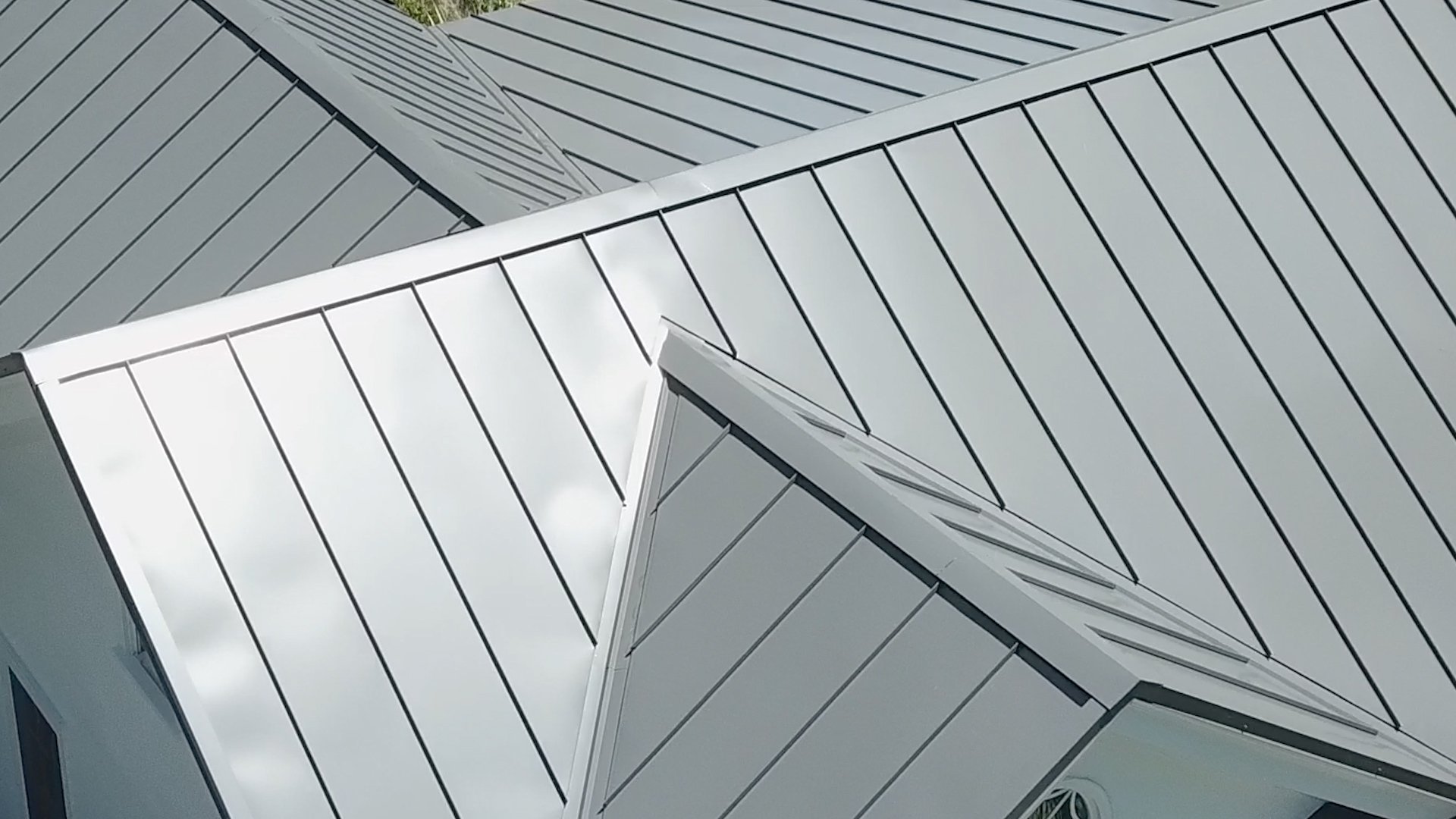
Metal roofs were once a hallmark of high-end homes. They have expanded their reach due to recent advances in roofing technology. This has made them more accessible. Metal roofs now account for a significant 15% of all roofing installations.
Contemplating a roof replacement can bring a mix of excitement and apprehension. One of the key decisions is choosing between traditional shingles and modern metal roofing. You may be asking, "Which one is a better investment for your home?" It's a big decision we get it!
Our journey at RoofCrafters stretches back to 1993. It has allowed us to witness the evolution of metal roofing from a niche luxury to a popular choice for many homeowners. While the allure of metal roofs is undeniable, we also recognize the questions and uncertainties they bring. We want to address those with you.
If you're pondering a transition from shingles to metal, you're in the right place. This article aims to address your questions about metal roofs. It covers aspects like durability, noise, rust resistance, and more. Join us as we delve into the world of metal roofing, helping you decide if it's the ideal choice for your home.
Your Metal Roofing Choices Explained
Metal roofing has indeed made a remarkable comeback. It's fascinating how it's transitioned from its early 20th-century popularity to becoming a modern roofing trend. Yet, despite its growing appeal, metal roofs remain a less common sight in most neighborhoods.
The reason? The initial investment.
Choosing a metal roof often means spending two to three times more than you would on traditional asphalt shingles. Sometimes, this cost can surge to even four or five times that of standard shingles.
But, before you get sticker shock, let's break down the key factors influencing these costs.
The type of metal, the design of the roofing panels, and the method of installation all play significant roles in determining the final price.
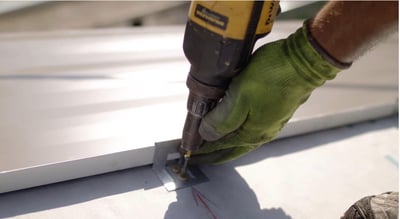
The three most sought-after metal roofing materials are aluminum, steel, and galvalume. Each comes with its unique benefits and price points.
-
Aluminum Roofing:
-
Pros: Aluminum stands out for its natural energy efficiency. It's highly reflective, making it ideal for regions with intense sun exposure. It's also fire-resistant and non-corrosive, which means if your home is near the ocean or in a salt-rich environment, aluminum roofing is a no-brainer.
-
Thickness Varieties: You'll find aluminum roofing in various thicknesses, commonly in .032, .040, or .050 mils. The thicker the material, the more durable your roof.
-
Finish Options: Aluminum comes in a raw mill finish that oxidizes to a natural sheen or a variety of painted finishes. Many paint finishes include warranties extending up to 45 years.
-
-
Steel Roofing:
-
Popularity: Steel is the go-to material for many metal roofs, balancing cost-effectiveness with efficiency.
-
Gauges: Unlike aluminum, steel roofing thickness is measured inversely – the lower the gauge number, the thicker the material. Common gauges are 24, 26, and 29.
-
Finish Requirements: Since steel is prone to corrosion, it always requires a paint finish. These finishes vary in warranty length, impacting the cost.
-
-
Galvalume Roofing:
-
Composition: Galvalume roofing combines a steel core with an aluminum coating, offering an effective barrier against corrosion.
-
Thickness and Profiles: Like steel, galvalume is available in the same range of thicknesses and panel profiles.
-
Finish Options: Unlike aluminum and steel, galvalume is typically available in a mill finish only, making it a slightly more budget-friendly option that’s still effective near coastal areas.
-
Understanding these options will guide you in making an informed decision. It balances your aesthetic preferences, practical needs, and budget. Remember, the best choice for your home is one that considers all these factors in harmony.
Exploring Aluminum Roofing: A Durable and Stylish Choice
Aluminum roofing stands out as an exceptionally energy-efficient option for homeowners. This is especially true for those living near coastal areas or places with high salt content in the air.
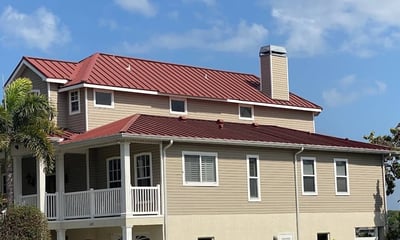
Its unique properties make it an ideal choice for such environments:
- Non-Corrosive Nature: One of the biggest advantages of aluminum is its resistance to rust and corrosion. This quality is particularly beneficial if your home is situated near saltwater bodies. You won’t have to worry about the salty air deteriorating your roof.
- Reflective and Fire-Resistant: Aluminum's high reflectivity contributes to its energy efficiency, making it a smart choice for hot climates. Additionally, its fire-resistant nature adds an extra layer of safety to your home.
- Variety in Thickness: Aluminum roofing is available in different thicknesses, with .032, .040, or .050 mil being the most common for residential use. The higher the number, the thicker and more durable the roofing.
- Finish Options: Homeowners can choose between two finishes:
- Mill Finish: Offers a raw, natural metal appearance that oxidizes over time to create a unique aesthetic.
- Paint Finish: Comes in a wide range of colors to match any home style. These finishes often include long-term warranties, ranging from 40 to 45 years, ensuring both longevity and ongoing visual appeal.
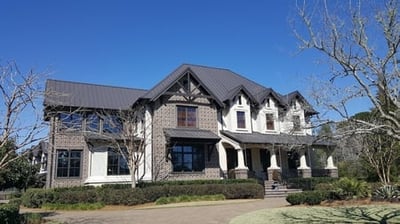
Choosing aluminum roofing means investing in a durable, efficient, and versatile roof. Its appearance can match your home's aesthetic. You can choose between a natural oxidized look or a vibrant paint finish for aluminum roofing. It promises to be both a practical and stylish addition to your home.
Unpacking the Benefits of Steel Roofing for Your Home
Steel roofing is the most preferred metal roofing material. It offers a blend of affordability and durability. Best used when you live at least 1.5 miles from the salt water.
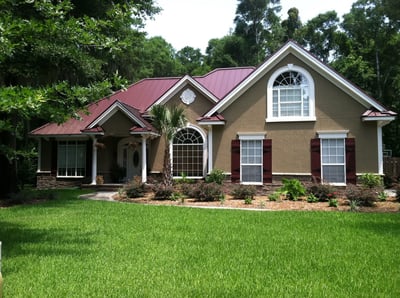
Let’s delve into what makes steel roofing a top choice for many homeowners:
- Galvanized for Durability: Steel used for roofing undergoes a galvanization process. This involves coating the steel in zinc, which enhances its durability and resistance to corrosion.
- Cost-Effective Quality: One of steel roofing's major draws is its affordability. It is less expensive. Despite that, it doesn’t compromise on durability and effectiveness compared to other metal roofing options.
- Gauge Variations: Steel roofing is available in different gauges. 24, 26, and 29, with the lower gauge numbers indicating a thicker and more robust material. This variation allows for more customization based on your specific needs and budget.
- Mandatory Paint Finish: Due to steel’s susceptibility to corrosion, a protective paint finish is essential. These finishes not only add an extra layer of protection but also come in various color options. Warranties for these paint finishes can range from 20 to 45 years, ensuring long-term appearance and protection.
- Diverse Price Range: The cost of steel roofing can vary significantly based on several factors. These include the type of steel panel, its thickness, and the quality of the paint finish. This versatility in pricing makes steel roofing an attractive option for a wide range of budgets.
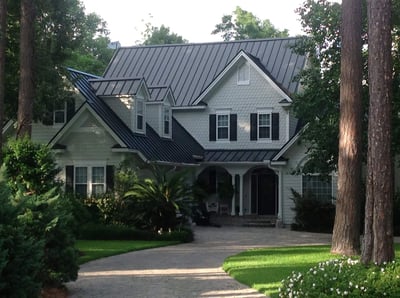
In conclusion, steel roofing offers a perfect balance between cost and quality. It is an excellent choice for homeowners looking for a long-lasting and efficient roofing solution. You can tailor steel roofing to meet your specific roofing needs. Whether you focus on budget-friendliness or long-term durability.
Galvalume Roofing: A Fusion of Durability and Value
Galvalume roofing merges the best of two worlds. It brings together the core strength of steel and the corrosion resistance of aluminum. Galvalume is much like steel roofing and comes in the same thicknesses, but it's most commonly left unpainted.
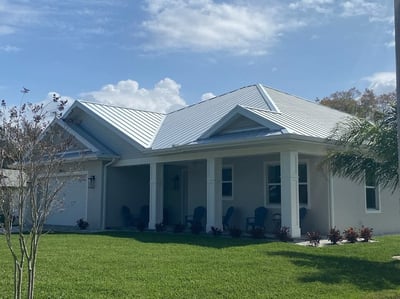
Let's explore why Galvalume is a noteworthy contender in the metal roofing arena:
- A Sturdy Core with Added Protection: At its heart, Galvalume boasts a steel core. This is then coated with aluminum, which significantly enhances its corrosion resistance.
- Versatile Thickness Options: Like steel, Galvalume is available in varying thicknesses - 24, 26, and 29 gauge. This range ensures that you can select the perfect balance of durability and flexibility for your roofing needs.
- Diverse Panel Profiles: Galvalume roofing is adaptable, whether your home has a traditional or modern look. It is available in all four major panel profiles, catering to a wide array of architectural styles.
- The Natural Look of Mill-Finish Metal: Galvalume is available in its natural, mill-finish state. This gives it a unique, raw metal appearance. It also makes it a slightly more budget-friendly option compared to its painted counterparts.
- An Ideal Choice Near Water: If your home is near the ocean or in a region with salty air, Galvalume is an excellent choice. It has anti-corrosive properties. It withstands the harshness of saltwater environments. This ensures longevity and maintains its aesthetic appeal.
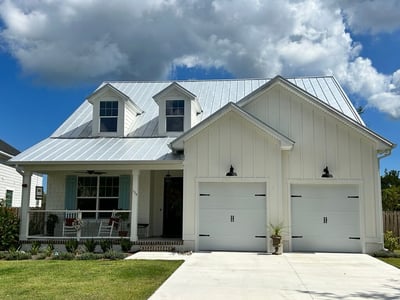
In summary, Galvalume roofing stands out as a robust, cost-effective, and versatile option for homeowners. Its unique blend of steel and aluminum coating offers a practical solution. It balances aesthetic appeal with long-lasting performance, especially in coastal areas.
Busting the Myth: Are Metal Roofs Really Noisy?
Have you ever wondered if raindrops sound like a drum solo on metal roofs? It's a common myth that metal roofs amplify the pitter-patter of rain into a noisy nuisance.
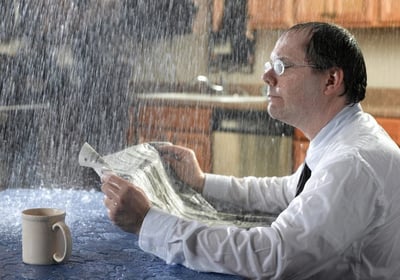
But here's the truth:
- Structure Matters: Metal roofing isn't laid bare over your living space. There's a whole roof deck between. Think of it as a buffer zone that diminishes the noise you might expect from rain or hail.
- Compared with Traditional Roofs: Surprisingly, metal roofs can be quieter than their asphalt or tile counterparts during a Floridian downpour or hailstorm. How? The secret lies in their installation. When fitted properly over a solid roof deck and underlayment, metal roofs can significantly muffle the sound of weather tantrums.
- No More Loud Rainy Nights: If you're imagining sleepless nights with every rainstorm, think again. Modern metal roofs are designed to keep the peace, ensuring that the only thing you'll hear is a soothing, muted sound that might just lull you to sleep.
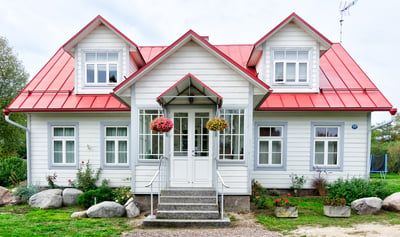
So, if the fear of a noisy roof has been holding you back from choosing metal, it's time to reconsider. Metal roofs offer durability and style. They also offer a surprisingly serene shelter from the stormy symphonies of Mother Nature.
Unveiling the Truth: Do Metal Roofs Rust?
Depending on the type of material used on a roof, it can last anywhere from
When it comes to choosing roofing materials, one of the biggest concerns homeowners have is whether their roof will stand the test of time. And for metal roofs, the big question is: Do they rust?
Let's shed some light on this:
-
Longevity of Different Roofing Materials:
-
3-Tab Asphalt Shingles: Typically last 15-20 years.
-
Architectural Shingles: Thicker and more durable, they can last 20-30 years.
-
Terracotta Roofs: Known for their durability, lasting up to 50 years but come with a higher price tag.
-
Metal Roofs: Can last an impressive 70 years, depending on the metal type and maintenance.
-
-
Metal Roof Durability:
-
Weather Resistant: Metal roofs offer exceptional durability against elements like hail and wildfires.
-
Energy Efficiency: Highly reflective, metal roofs keep homes cooler in summer, reducing energy costs.
-
Maintenance: If installed correctly, metal roofs need minimal upkeep.
-
-
The Rust Factor:
-
Types of Metals: Homes nowadays use metals like aluminum, copper, steel, and galvalume.
-
Choosing the Right Metal: Your choice should be influenced by local conditions and price considerations.
-
Corrosion Resistance: If you're near the ocean, aluminum, copper, or zinc roofs are ideal as they resist salt air corrosion.
-
-
Addressing Corrosion Concerns:
-
Aluminum Roofs: Non-corrosive and great for coastal areas.
-
Steel and Galvalume Roofs: While steel is a corrosive metal, modern steel roofs are often treated with protective coatings to resist rust.
-
Copper Roofs: Not only do they not rust, but they also develop a unique patina over time.
-
In conclusion, a rusty roof might seem off-putting. However, the right material and maintenance can make a metal roof long-lasting, durable, and rust-resistant. It can be a good option for your home. If you live near the coast or in areas prone to harsh weather, choosing aluminum or copper can give you added peace of mind against corrosion.
Metal Roofs and Lightning: Separating Fact from Fiction
When discussing metal roofs, one common concern is their susceptibility to lightning. Will they attract lightning?

Let's explore this aspect to provide clarity:
- Myth vs. Reality: It's a widespread myth that metal roofs attract lightning. In reality, metal roofing does not increase the likelihood of your home being struck by lightning. Lightning strikes the highest object in an area, regardless of the material.
- Safety in a Lightning Strike: If a metal roof does happen to be struck by lightning, it is less hazardous compared to other roofing materials. Metal roofs are noncombustible, meaning they won't catch fire.
- Conductivity: While metal is a good conductor of electricity, it disperses the energy safely throughout the structure. This can be an advantage in a lightning-prone area.
- Protection Measures: Homeowners can further mitigate risks by installing a lightning protection system. This system directs the electrical charge away from the roof and home, grounding it safely.
In conclusion, the fear of increased lightning strikes due to metal roofs is unfounded. Metal roofs offer a high level of safety and do not attract lightning any more than other roofing materials. Metal roofs are fire-resistant. Additionally, you can opt for extra lightning protection systems. This makes metal roofs a safe and wise choice for homes in lightning-prone areas.
What’s Included in a Metal Roof Warranty?
Absolutely not. Not only are metal roofs, no more likely to be hit by lightning than roofs covered with singles, but if they are stuck, they are 100% noncombustible. Typically made of steel with a protective zinc coating, a galvanized roof is also resistant to rust and high winds that accompany electrical storms.
If you want the look of a slate or tile roof with the price and durability of steel, one of these products could be just the ticket. However, the real reason some homeowners choose these over actual tile or slate roofs is the price and weight differential.
While many traditional roofing companies offer “Lifetime Warranties” on shingle roofs, you need to read the fine print of each company's warranty. Far from guaranteeing a roof for life, some roofing companies and manufacturers define a lifespan as short as 5 years depending on the severity of the climate in a given area.

According to State Farm Insurance, a homeowner will typically replace their home’s shingles 2-3 times over 50 years, while those who install a metal roof will rarely have to install a second roof since they typically last from 50-70 years. Metal roofs are also impervious to fire, rot, and damage by insects and rodents.
Ready to Explore Metal Roofing for Your Home?
Deciding on the right roof for your home is a significant choice. It's not only about the material. It's about matching your style, considering your budget, and making a decision that you'll be happy with for years to come. A metal roof could be the right fit for your home, offering durability, style, and efficiency. But how can you be sure?
It's always a smart move to chat with a local roofing expert. They can offer you insights specific to your home's needs and the local climate. Plus, they'll help you navigate through the array of options to find the perfect match for your house.
If you're just beginning to dip your toes into the world of metal roofing, we understand it can feel overwhelming. That's why our family at RoofCrafters has created educational roofing content. It's located in our learning center and it's filled with helpful information. Hopefully, you will get clear, honest answers you need to make a well-informed decision.
For those of you in South Carolina, Georgia, or Florida, we're one click away. Click the "Schedule an inspection" button below. Let's start talking about transforming your home with a new roof.
At RoofCrafters, our mission is to provide job opportunities for others to thrive and grow while making a meaningful impact within our communities.




